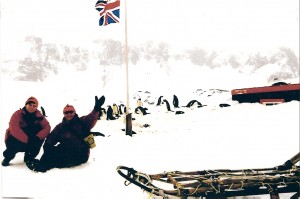 Dr. Chris Curry spends about ten months a year working as an emergency physician at the Fremantle Hospital in Western Australia. When he’s not doing this he can sometimes be found at the docks in Ushuaia, Argentina getting organized for Quark Expedition’s next voyage to Antarctica.
Dr. Chris Curry spends about ten months a year working as an emergency physician at the Fremantle Hospital in Western Australia. When he’s not doing this he can sometimes be found at the docks in Ushuaia, Argentina getting organized for Quark Expedition’s next voyage to Antarctica.
Chris is in charge of medical staffing of the vessels, which travel down to this part of the world. I had a chance to speak with him recently while en route to the Antarctic.
I asked Dr. Curry what special problems physicians can expect to run into while cruising the southern polar region. “First of all we are extremely isolated in the Antarctic,” said Chris. “You can’t just call for a plane and expect to get flown out down here. Even if you’re near an airstrip the weather is so unpredictable that it could be weeks before a flight could get in. And airstrips are almost non-existent. However, any nearby ships will respond to a true emergency with all the help that they can muster.”
Curry makes sure that a qualified physician is on board each of the vessels for which he is responsible, frequently providing staffing himself. “The Antarctic is a bit of a frontier and there are no legal requirements. But, you can’t just appoint a retired dermatologist to staff a vessel. Qualified emergency room physicians are best, and sometimes those from secondary rather than tertiary care centers are more self-reliant. The emergency doctors in big city hospitals can get too dependent on consultants.”
 Curry tells me that true emergencies are actually rare on board ship. “Most of the individuals choosing these expedition-cruises are pretty well so we don’t get too many acute problems. Trauma from falls can also be a problem in heavy seas.
Curry tells me that true emergencies are actually rare on board ship. “Most of the individuals choosing these expedition-cruises are pretty well so we don’t get too many acute problems. Trauma from falls can also be a problem in heavy seas.
Is hypothermia is a problem and how does he deal with it? Replies Curry, “The waters around here may be minus one degree Celsius, and there is this common myth that people can be dead within very few minutes with immersion under these conditions. In reality hypothermia should not set in for some time if the individual is well clothed and refrains from thrashing around in the water. These actions will dissipate body heat by circulating cold water around the body.” He adds, “Death can occur quickly, however, if a person is unprepared for an immersion, usually by drowning from a lung full of water after an involuntarily gasp. Also bradycardia, or ventricular tachycardia can ensue with unconsciousness and subsequent drowning.”
What about any other special medical concerns in the Antarctic?
“There are a lot of things we just don’t know. Some of the sub-Antarctic islands have been contaminated with rats and there have been reports of illnesses in the personnel in bases, which can be hard to explain. Are they related to the rats? We don’t know. Also we really haven’t studied the diseases and microbes in a lot of the indigenous wildlife. Could we catch something from the seals or penguins? Could they catch something from us? Again, we don’t know.” Curry tells me he plans on publishing a paper on this subject some time in the future.
So far, however, despite tourists numbering up to 12,000 per year, there appear to have been no problems with unusual diseases among visitors to the Antarctic. Landings usually last only a few hours and guidelines forbid touching animals and advocate keeping at least fifteen feet away. Compared to the risk of illnesses like malaria, typhoid fever and hepatitis A in destinations such as Africa and Asia, Antarctic travel appears to be pretty safe.
Photo Credits
All photos © John Haynes
“Port Lockroy”
“Gentoo Penguins”


[…] This post was mentioned on Twitter by Gil Namur. Gil Namur said: RT @lifeasahuman: New Article, Dr. Chris Curry – A Doctor in Antarctica – http://tinyurl.com/2buh8r8 […]